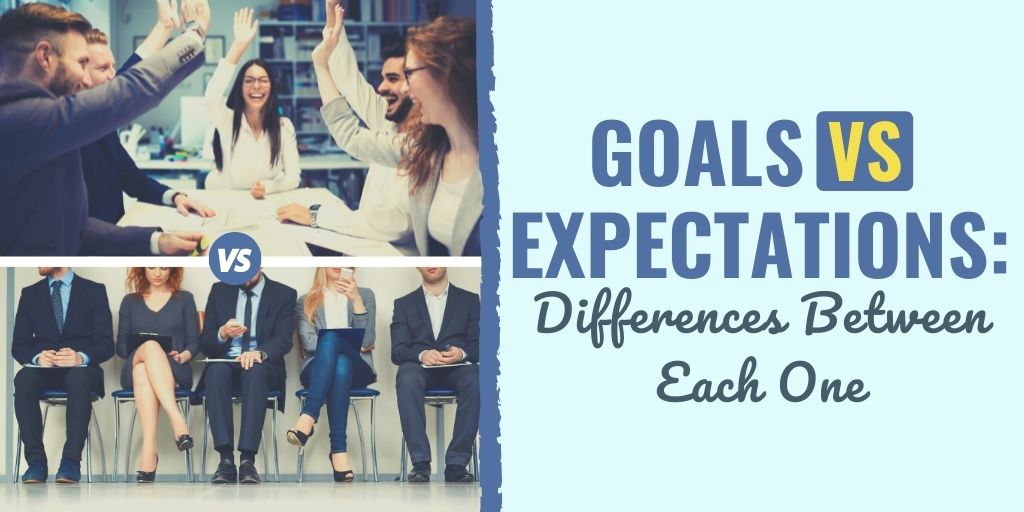Almost all of us go through life having goals or expectations. Not everyone knows the distinct differences between the two, and can get confused when setting and attempting to accomplish their goals.
Today, I'll help clear up the misunderstanding by explaining the differences between goals vs expectations, provide five examples of how they differ and touch upon creating S.M.A.R.T goals.
What are Goals?
A goal is something you wish to achieve but need to direct effort, time, and resources to attain it. The goal might be a thing you can see, touch, feel, or experience.
Goals fall into different categories, such as business, education, career, health, family, relationships, and personal development. Common examples are buying a new home, quitting smoking, developing a good habit, or breaking a bad one.
A goal isn't a mere desire, vision, objective, dream, ambition, and certainly not an expectation. Notwithstanding, these are relevant aspects of goal setting.
What are Expectations?
An expectation is a strong belief that something will occur or manifest in the future, in the exact way that you perceive it.
A person's expectations are usually closely related to their personal beliefs and are based on assumptions that something will occur the way they want or someone will behave a certain way.
The issue with expecting things is it causes you to anticipate outcomes you may not have control over. For example, a change in someone else's thinking or behavior or that the train will arrive on time as scheduled.
5 Differences of Goals vs Expectations
Goals
Goal setting is a smart choice for those with a progressive mindset who know it takes more than expecting a desirable outcome.
1. Goals are intentional
To set a goal, you need to first know what specifically you're planning to achieve before creating the plan. You'll need to determine what or who it will involve, where it will happen, and what's required to bring it into reality. These details give structure and clarity. Next, you MUST intend to act on the plan within a defined time. Your goal remains a static idea until you take action to achieve it, whether you're working toward something as major as a career or a new bedtime routine.
2. Goal outcomes are predictable
In the truest sense, goals are realistic, and because they are, you can predict the results with a greater degree of accuracy compared to expectations. This applies to short-term, long-term, life-based, and time-based goals. In fact, successful people keep on achieving because they can measure the anticipated outcome with a degree of certainty. They'll consider the current reality and potential future changes to predict results and make adjustments to stay on target.
3. Goals require effort to accomplish
People use goals as success tools, but not everyone is aware that conscious effort is required to manifest them. That may explain why only 8 percent of people get to achieve their goals. The chance of achieving a goal increases if it is properly conceived, attainable, and adjustable, and you're committed to bringing it to fruition. You can aspire to enhance mental and emotional wellness, but that's not going to happen unless you implement the strategies, such as self-care, gratitude, mindfulness, meditation, or behavioral therapy.

4. Goals are challenging but reachable
An underlying reason why people set goals is that they usually aren't things they can attain with the click of a finger, without effort. Goals often represent a life challenge you want to overcome and one you know is attainable. For example, you want to get back to a certain weight. You'll need to forego greasy foods, eat healthier, and lower calorie intake to see results. Those are challenges, but they serve as motivation to get to the desired weight. Regardless of the goal, motivation pushes you to reach your fullest potential.
5. Goals provide a sense of purpose
There are people who live aspiring nothing in life—not material possession, education, career, change in habits, or personal growth. Then they wonder why they feel empty or lack purpose. Goals let you see a bigger and broader vision for how you want your life to unfold. Setting and achieving them adds meaning to life, increases personal satisfaction, and boosts happiness. Further, setting another goal as fast as you achieve one provides a continuous sense of purpose.
Expectations
Being unclear about what goals vs expectations are leads to disappointment, resentment, and unhappiness. Mere expectations could be the reason you aren't achieving the things or changes you envision. Here is why.
1. Expectations are desires
Expectations are desired outcomes we wish for ourselves and impose on others. Many times, they aren't even realistic. For example, hoping your partner meets all your needs. People can only meet our needs as far as they're willing and physically, mentally, emotionally, intellectually, or financially capable. A relatable example is a woman believing a man will commit to her after at least 3-6 months of dating. That's placing a cultural burden on someone who, because of commitment phobia (a mental health condition), might be unable to satisfy that need.
2. Expectations are ambiguous
You can expect just about anything without knowing if, how, or when it will come to pass. Since you have no control over the future, whatever you're hoping for remains vague and open-ended. While they are not goals, you can prepare for expectations, such as buying a suit for a wedding you expect to attend.
3. Expectations lack certainty
Even though you're trusting the universe for something to turn out according to the dictates of your mind, there's no certainty to hold on to. In some cases, there's no action you can take to influence the outcome the way you can with goals. It's essentially a wait-and-see situation, which has the potential of causing you to feel nervous, anxious, or depressed. For example, we expect COVID-19 to go away, but no one knows if it will.
4. Expectations are possible not probable
The probability of an event or change occurring increases if you're able to affect the outcome. Acquiring an academic degree is a goal you have control over, providing you have the necessary resources, e.g, time and finances. You can expect to get your master's, but without a plan and ways to execute it, you're simply going on expectations. Here's another example. It's possible to live to age 100, but you probably won't because the average lifespan is 77.0 years.
5. Expectations affect attitude
The things you have a strong belief will happen can adversely influence your thoughts, feelings, and behavior, particularly if they are impractical, unreasonable, or farfetched. Likewise, positive feelings emerge when you experience what you hoped for. Negative feelings such as disappointment or anger are common when things don't turn out as anticipated. Shattered expectations can be a significant source of stress and drive people to unhealthy choices, such as alcohol drinking or drug use, as a way to cope.
Setting Goals the S.M.A.R.T Way
In setting goals, it's important to place emphasis on the SMART approach developed by George Doran, et al. Goals are S.M.A.R.T and lead to greater success if they are:
Final Thoughts on Goals vs Expectations
Goal-setting is a progressive way to live. Goals are practical and attainable and can be predicted with a greater degree of certainty.
Expectations are not certain and can often trigger resentment whenever they don't match up to your reality. It’s great to have high expectations of yourself and others, but there is an inherently greater risk to doing so.
You can’t let failed expectations set you back. That is why you need to be “SMART”. For more on effective ways to achieve goals, check out The Ultimate Guide to Setting SMART Goals.
Finally, if you want to take your goal-setting efforts to the next level, check out this FREE printable worksheet and a step-by-step process that will help you set effective SMART goals.


